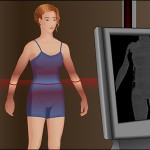Big Data, Little Me
On Friday, I don’t have any classes, but I still woke up pretty early to check on some necessary stuff for this semester. Namely, I flipped open my computer to get on Amazon Prime and order three books for a film class I’m taking. I order books from here all the time. If I wanted to deny that, I probably couldn’t do so with much conviction. Why’s that? Oh, because of the very convenient, very invasive “Recommended For You” and “Buy It Again” sections that pop up on my computer whenever I visit Amazon.com. I’ve noticed that, perhaps, I’ve become addicted to and maybe even reliant upon the efficiency of this site. Free shipping? Absolutely. And, in just two days? There is a god.
Prior to the class discussions thus far, I have actually given some thought to my presence online. It started in sixth grade when I sneakily created a Myspace account and then lied to my parents about it after my older sister sold me out. There was a theatre-worthy conversation about the importance of protecting my information, myself. I deleted my account. Whatever.
Anyway, as I looked at Amazon’s suggestions that presented themselves to me left and right, I thought more deeply about what my online purchases say about me. That I love books and organic shea butter? That I can’t stop, won’t stop buying them? Nubian Heritage Shea Butter with Lemon Grass and Tea Tree Oil was–and probably still is–just one click away from being bought again and shipped to me in two days if I bought it within those next nine hours. I told myself that I really didn’t need anything else right then, and I kicked myself off Amazon.
But, then I was bored. I kind of wanted to look at clothes online. I work in retail, so I get a discount at a few different stores. This fact often justifies many purchases I make from exploring Free People’s online catalog. In fact, this specific store has a predominantly online presence, so I’m already screwed in that way. So, I’m scrolling through the dresses and contemplating what I might want to wear to a wedding in September of this year. Then: I realize I am broke and ridiculous, and I should stop gawking at all the beautiful, flow-y dresses.
Get on Facebook, my brain said. Check Facebook.
I logged into my Facebook account, and what happens to me but a cyber-attack from Free People models in the cool, Free People clothes popping up on the right side of my screen? How obnoxious! Stupid, save your money. Save. Your. Money, I thought. I ignored the advertisements, realizing that the internet is one big stalker we can never fully escape. Suddenly, my best friend’s upload of pictures came up in my newsfeed. I clicked through the pictures, wasting my time, before I decided to text her. I needed her opinion on some dresses for a wedding I have to go to… Eventually.
I logged off Facebook, sensing that I’d already let too much of my morning be spent on the computer. Yet, as I shut the screen of my laptop, I contemplated what just three different sites managed to say about me. My online presence has established my personal style, my literary tastes. Can the internet pick out my outfit for me tomorrow? Can the internet pick out what books I’ll want for summer reading? Can somebody psycho-analyze little me based off Big Data? Am I reduced to my online presence, even just part of it?
 Previous Post
Previous Post Next Post
Next Post
This is certainly a concept I’ve always found both really useful and extremely frustrating. I’ve never been one for either online shopping, but similar services (such as youtube recommending videos for me to watch based on things i’ve already seen) on one hand are really convenient if I’m bored and sometimes they even show me things I never would’ve found on my own. But there’s always the concern that some image of me is being formed based on the recommendations popping up based on a video I clicked on accident once.
I enjoyed the comparison to the internet as “one big stalker we can never full escape.” I also have experienced advertisements for retail on Facebook, but sometimes I don’t mind it because it gives me ideas on outfits without having to go out of my way. I also don’t like how you can search for one thing online, and proceed to receive 80 suggestions on similar concepts, even if you weren’t exceedingly interested in the original search.
I can relate to sneakily creating a MySpace and then having a discussion about protecting your privacy with your parents. What’s interesting for me to think about is to see the shift from our parents scolding us for having a online profile to scolding us for not having one. My parents who once thought that I was going to get abducted by some creeper who found my MySpace now encourage me to build my own website and have a Linkedin to attract potential employers. What are your parents thoughts on your online presence currently?
I really think that the whole “computer picking out an outfit for you” is steps away from happening. It seems to me with all of the apps that apply makeup to your selfies, anything is possible. I think it’s interesting because not only are you giving information about the things that you like to shop for, but google and ads can use that to match you to other shops that you may like! I love vintage, rockabilly, and pin up style attire, and I’ve found many of the retailers that I enjoy due to facebook ads. In a sense, it is very effective.
I’m not sure if it upsets me more that my computer knows me better than myself, my husband, or my peers, or if it upsets me more that it knows how to take all of my money!
This post and the comment thread bring up an interesting point that we haven’t really had the opportunity to discuss in class much at this point: almost all of this data collection and its usage is directed toward getting us to spend more money. Part of the problem is the big data gap – it’s mostly large businesses that have this data.
I think the more interesting question we could think about is: What would we attempt to do if we had access to lots of big data?